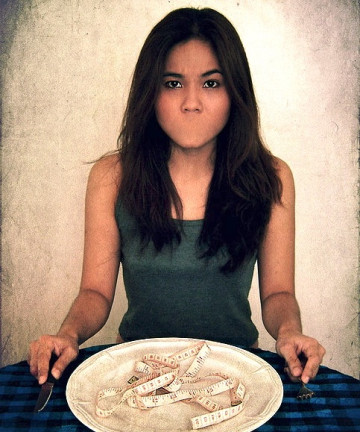Excessive Dieting Linked to Suicide Attempts—RI Hospital Study
Thursday, June 07, 2012
Does the pain of excess dieting link to the potential for self harm? A new study from RI Hospital looks closer. Photo: Helga Weber/flickr.
BDD is a common, often severe, and under-recognized body image disorder. People with BDD experience distressing or impairing preoccupations with perceived flaws in their appearance and are obsessed with the belief that something is wrong with how they look, when in reality they look normal. More than 75 percent of people with BDD feel life is not worth living or think about suicide in their lifetime, and approximately 25 percent have a history of a suicide attempt.
Looking for links
Authors Tracy K. Witte, Ph.D., of Auburn University, Elizabeth R. Didie, Ph.D., a psychologist in the department of psychiatry at Rhode Island Hospital, and Katharine A. Phillips, M.D., director of the Body Dysmorphic Disorder Program at Rhode Island Hospital examined the association of suicide attempts with physically painful BDD-related behaviors, including restrictive food intake, excessive exercise, BDD-related cosmetic surgery, compulsive skin picking, and physical self-mutilation.
GET THE LATEST BREAKING NEWS HERE -- SIGN UP FOR GOLOCAL FREE DAILY EBLASTThe study found that BDD-related restrictive food intake was associated with more than double the number of suicide attempts, but was not associated with suicide ideation; and that those with a history of BDD-related excessive exercise had less than half the number of suicide attempts as those without such a history. The study also found that none of the other variables indicating exposure to painful and provocative experiences, such as BDD-related cosmetic surgery and compulsive skin picking, were significant predictors of suicide attempts.
A connection between the pain of caloric restriction and self-harm
Because restriction of food intake can be physically painful, the researchers theorize that a person who is capable of enduring the physical discomfort of caloric restriction may be more capable of enduring the physical discomfort required in order to inflict self-harm. They theorize that severe restriction of food intake that results in long-standing physical discomfort would predict capability for suicide, whereas more moderate dieting behaviors would have less of a relationship (if any).
“Significantly limiting food intake can be physically painful,” Phillips said. “It goes against our natural instincts to feed our bodies and respond to the physical pain that comes with extreme hunger. The results of this study suggest the importance of assessing individuals with BDD for restrictive eating behaviors to identify suicide risk, even if they have not previously been diagnosed with an eating disorder.”
The study
The study included interviews with 200 individuals (68.5 percent women) between the ages of 14 and 64 who had a lifetime diagnosis of BDD. The main criterion variable was the participants’ number of past suicide attempts, which ranged from 0 to 25 in the study group. Additionally, 78 percent of the study group had a history of suicide-related ideation. The study only included examination of suicide attempts, not deaths by suicide.
“While some of the other BDD-related behaviors may seem outwardly more painful – such as undergoing repeated cosmetic procedures, or compulsive skin picking, the level of pain associated with excessive dieting could significantly increase a person’s pain tolerance,” Didie said. “This study suggests that those who are capable of enduring such physical discomfort and pain from restrictive eating also may be capable of enduring the physical discomfort required to inflict self harm.”
The National Institutes of Health funded the study (grant #R01 MH60241). Didie’s and Phillips’ principal affiliation is Rhode Island Hospital, a member hospital of the Lifespan health system in Rhode Island. The researchers also have an academic appointment at The Warren Alpert Medical School of Brown University. Their research is fully supported by Rhode Island Hospital and the Lifespan health system. Also involved in the study was William Menard, BA, of the department of psychiatry Rhode Island Hospital and The Alpert Medical School in Providence.
For more Health coverage, don't miss GoLocalTV, fresh every day at 4pm and on demand 24/7, here.
Related Articles
- New Suicide Prevention Initiatives in Rhode Island
- NEW: Senator Reed Secures Federal Funding For Suicide Prevention Program
- Brown Study Finds New Links Between Alcohol, Diet, and Breast Cancer



